Six recent fashion school graduates are bringing the richness of their pasts with them as they usher in a bright future—the industry’s and their own.
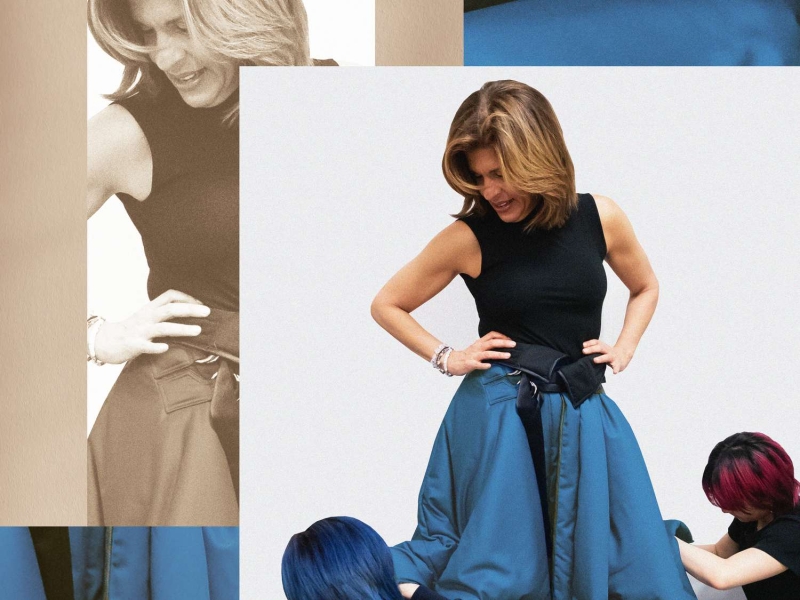
Making a name for yourself in the fashion industry is no easy task. Creating your own brand is expensive and time-consuming; countless try, few make it. And still, six recent graduates from the Fashion Institute of Technology (FIT) — Papa Oppong, Anthony Oyer, Deborah Won, Valeria Watson, and design duo Cristina and Margarita Ng Ng — are on the brink of figuring it out and leading with their talent, ambition, and love of fashion.
All those attributes were on display during a recent week-long TODAY with Hoda and Jenna segment, “Design the Look,” spotlighting the designers’ stories and their craft. “The fashion world is fierce. I mean, you can see it,” says Hoda Kotb when she and her TODAY co-host Jenna Bush Hager join an afternoon Zoom call with InStyle. “To get your break, you just have to be at the perfect timing, be lucky, and be talented all at once.”
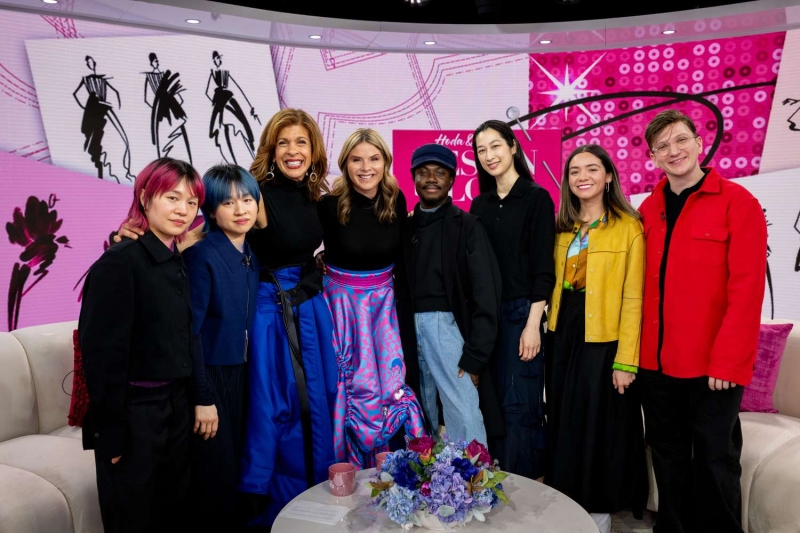
Throughout the week, the alums dressed the hosts in custom-made pieces that reflected both their own fashion ethos and Kotb and Bush Hager's personal style. "We're not fashionable," Kotb says definitively. She quickly clarifies that outfit repeating is the norm for the two on their very popular morning show — "but don't count them!" she quips. Bush Hager adds that sometimes the outfit repeating comes when they borrow from each other's work wardrobes. Now, they each have several special items to share when they practice that (arguably sustainable) habit.
"We feel like our show is a place for emerging talents in all fields," Bush Hager explains. "[With] these designers, we were totally blown away. We couldn't believe it. They were so talented." The editors at InStyle couldn’t agree more. Read more about the designers’ backgrounds, their inspiration, and the ways they plan to change fashion from within, below.
Valeria Watson
Valeria Watson hails from Mexico, a place that both inspires her designs and where her clothing is physically made. “I had to ask myself, Do I want to [produce] in New York, or do I want to do it in Mexico? And I decided in Mexico because, for me, it’s a good way to tell my story and also to support the country where I’m from,” she says. In Mexico, the textile industry is growing steadily, and Watson says she has the privilege of being a part of it; her garments are made in partnership with local artisans.
Home is part of the storytelling of her clothing. In the pieces she made for Kotb and Bush Hager, she also included their stories. "Jenna looked like a Texas sunset," Kotb says. (Bush Hager is from Texas). "And she had me in, like, a huge atlas, but she strategically placed countries that were important to me in important spots. She put Egypt in a spot and New York." (Kotb is Egyptian-American and lives in New York.)
While Watson's pieces speak to the bigger picture in an artful way, they're also functional. "It's conceptual but wearable," she explains.
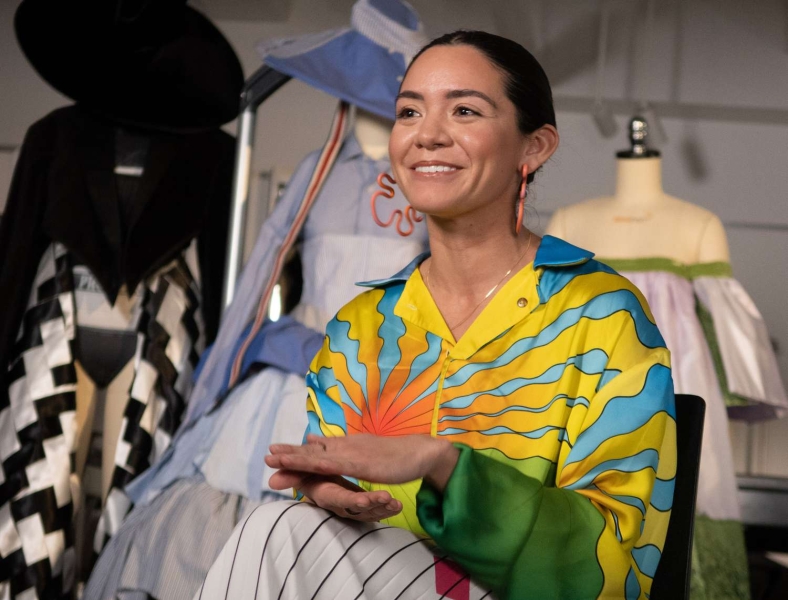
InStyle: Who is your biggest inspiration or muse?
VW: My mom is my muse. She is someone who has always wanted to do fashion. She has been sewing since she was a kid and finding joy in making her clothing. She never had formal fashion training but would find draping methods to make it work. She is hardworking, creative, and, most importantly, caring.
I do not think of any particular physical aspect when I think of designing. It does not matter what body is carrying the clothes that I make. What matters is the spirit in which they carry the clothes and the essence in their body. I want people who wear my clothes to be caring and have the same values as my mom. To care where the clothes come from, who made them, and even to question if they have meaning.
InStyle: If you could pick a song to go along with your design aesthetic, what would it be and why?
VW: “Shulaguapa (feat. El David Aguilar)” by Caloncho & Gabacho. It is a song about going around Mexico with someone you love. I want people to take a part of Mexico with them when they purchase my clothing. And hopefully, they will be able to feel the way that I feel while listening to this song.
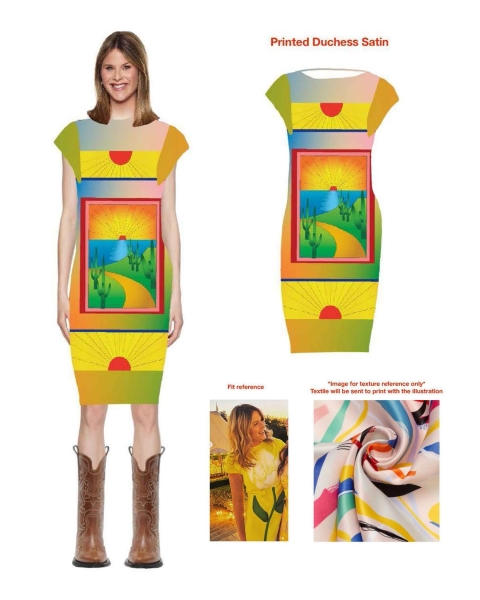
InStyle: How do you consider sustainability when you are designing?
VW: Sustainability is part of my work and way of living. Questioning myself how I can make the clothing sustainable is a key point during my design process. Many of my looks, especially my runway looks, are upcycled. Heritage is such a big part of my work that sometimes, the best way to show it is by using my parents’ and grandparents' old garments. I have made garments completely from my dad's old shirts. Or, I use wearing methods so that I can weave exactly on the shape of the pattern, and there is less, if any, cutting wastage.
But sustainability is not just about the environment; it also encompasses social and ethical aspects. It's important to me that the factory workers involved in the production process have sustainable livelihoods by receiving fair wages. And that the design is timeless and provides comfort to the wearer. By creating designs that are sustainable in all these dimensions, we can contribute to a more mindful and responsible fashion industry.
Papa Oppong
Last year was a great one for Papa Oppong, and not just because his lifelong fashion inspiration — Barbie — was everywhere. In March 2023, Oppong was honored with the Graduate Award at the Fashion Trust Awards, and since then, his career has been on an upward trajectory. Achieving such dreams is the reason the Ghana native moved to New York City just before the pandemic, but home is always where his inspiration comes from.
"There are always elements of Accra, cities and townscapes, and landscapes of Ghana within my collection," he says. He went on to explain that he's found it difficult to tell the stories of pre-colonial Accra through clothing because so much of that history has been lost; his goal is to celebrate his country and city’s past to the best of his ability through his designs. "If it's through the [fabrics] that are woven by local artisans, or if it's through the color palette, [which is] similar to the sunsets and Accra, there are always elements of home in the pieces that I'm creating today," Oppong says.
InStyle: How do you consider sustainability when you are designing?
Papa Oppong: Anyone I work with will tell you how much Papa hates waste in fashion. When I started my brand, it was important to me that I never contribute to the waste that the industry notoriously produces daily. I even coined the slogan: "Create Less / Waste Less" in a bid to do just that — create only what is needed and nothing more. I have taken a stance to avoid clutter and wasteful inventory.
When it comes to mass production, many designers are cornered by minimum order quantities and a host of other terms that force them to produce more than they can sell, store, and discard. This creates a vicious cycle of waste with no end in sight. As someone who comes from Ghana and lived his whole life in Accra, I have seen what waste in fashion can do to our planet. I am no stranger to the mounds of second-hand clothing found in Kantamanto (the largest second-hand market in the world). This is why Papa Oppong is strictly on a pre-order basis. We only make what is guaranteed a closet and, in so doing, have little to no inventory at any point in time.
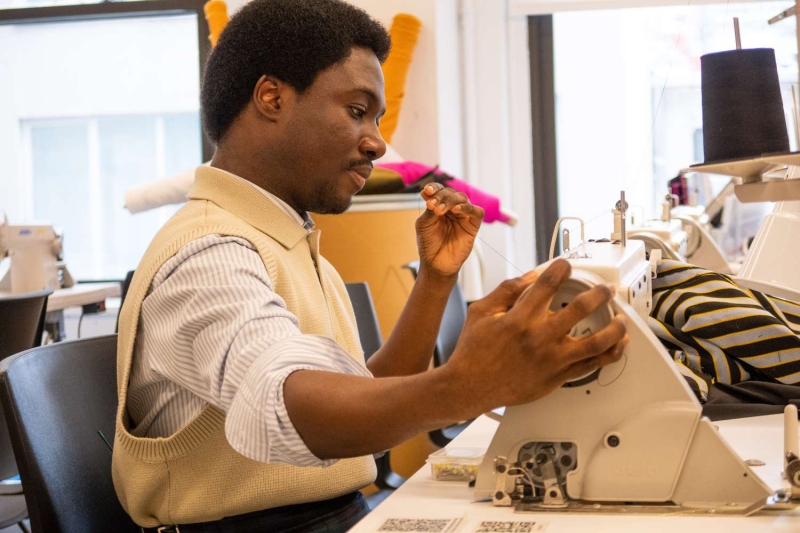
InStyle: What did it mean for you to have your clothes on TODAY with Hoda & Jenna?
PO: My main goal is to bring Ghanaian traditional craftsmanship to the world stage, and what an incredible way to do it! When I got the opportunity, I knew immediately the direction I wanted to go with Hoda Kotb and Jenna Bush Hager's dresses. I wanted to create shapes that were familiar to the hosts with textiles that felt new and different from anything they may have in their wardrobe already. I used the very iconic Fugu textile, which is native to the people of the northern region of Ghana. These striped textiles were woven by local Ghanaian artisans on wooden broad looms by hands and feet! It's truly a remarkable craft that I aim to preserve through my work.
Jenna's fabric also got the original Papa Oppong treatment. I hand-painted an illusion of embroidery threads on the waistline and neckline with gold 3-D paint to add a touch of royalty because Ghana is known for its gold. Seeing such a vibrant display of my country's style and culture on the iconic TODAY show was nothing short of beautiful!
InStyle: Who is your biggest inspiration or muse?
PO: Rihanna! I adore Rihanna! I mean, what a queen! You know, anytime I'm creating an idea, I ask myself: Will Rihanna wear this? And if the answer is "Yes," then I know I have a winner! The generation before ours had icons like Audrey Hepburn and Farrah Fawcett, and we have thee Rihanna.
What I love about Rihanna is you can tell she has fun with fashion; nothing she wears feels forced on, and that's what fashion is all about to me — it's about playing dress up, it's about wearing things in your own unique way, and it's certainly about transforming into whoever you want to be whenever you feel like it. Rihanna embodies all of these elements, and she is definitely my biggest muse.
Beyond the style, I really identify with her very beautiful story of coming from a small country into a bigger country and building a global empire that is well-respected. This is a clear example of what's possible and has been a great guidebook for me and my goals. I can't wait to dress Rih someday!
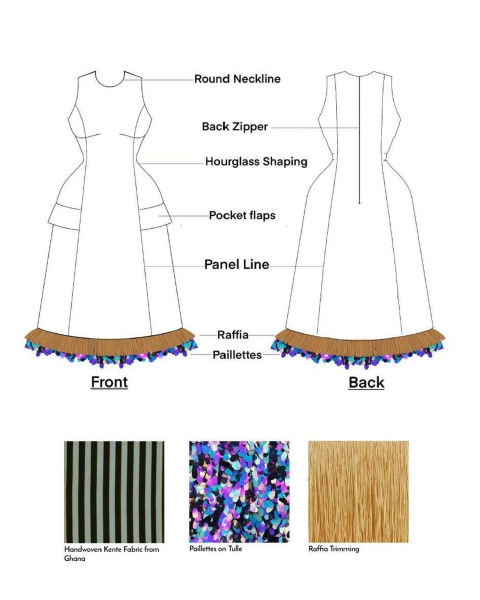
InStyle: If you could pick a song to go along with your design aesthetic, what would it be and why?
PO: My friends will tell you how much I love music! I am always listening to songs from different time periods and genres — from South Africa's Gqom to everything Tame Impala has ever put out! I am a huge Beyoncé fan, so you know Renaissance is always on repeat. If I had to pick a song that matches my design aesthetic currently — and this is a tough one — it would have to be the entire Oumou Sangare album Moussolou from 1989. She is an incredible Malian artist with a very contemporary sound. Two songs on that album have been on repeat for a while and have really helped me get into the vibe of designing my recent work: "Ah Ndiya" and "Diaraby Nene," the latter of which was sampled by Beyonce, Jay-Z, and Childish Gambino in "Mood 4 Eva".
Deborah Won
Pisces Rising, Deborah Won’s brand, is, as she puts it, "a little science experiment." That could be because Won's career in fashion has been a series of trials to see what works. "I worked in the fashion industry for over 10 years before taking a break away and ended up teaching undergraduate fashion design and fashion history research for first- and second-year baccalaureate students. And in the process, I realized how much the industry had changed and what new technology there was." Won decided to go back to FIT to get her MFA, and around the same time, she found out she was pregnant with her now-2-year-old daughter.
She was ready for both. And it's factored into how she designs: forward-thinking and comfortable. She considers why her customer is wearing her pieces before she decides on fabrics and cuts and adjusts accordingly.
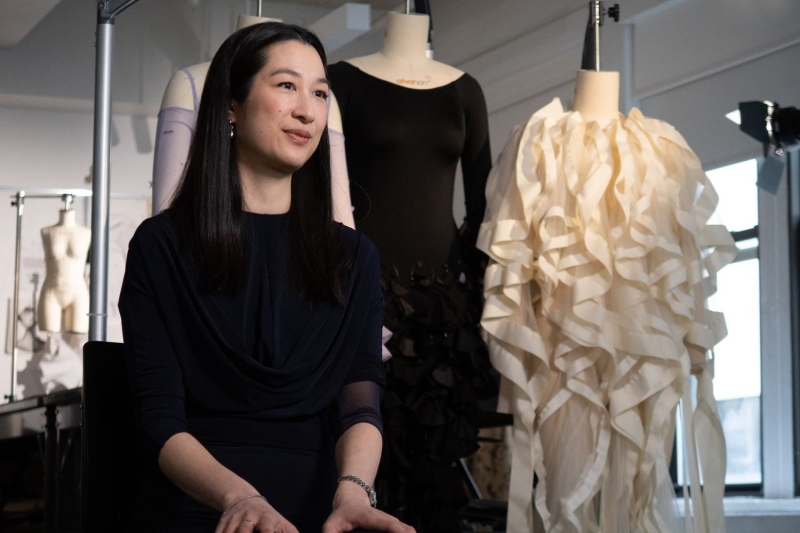
“We're used to going out feeling so squeezed into something," Bush Hager says, contrasting that with wearing Won’s designs. “So, to create something that looks good but is also so wildly comfortable, as if we were wearing a tennis dress. Not kidding, it was so awesome."
InStyle: As an up-and-coming designer, what is the one thing you wish people understood about starting out?
Deborah Won: You must make time to play. Outside of rest, recreation is essential to learning, creativity, and social engagement. It also prevents burnout, which can be common in this industry.
InStyle: What did it mean for you to have your clothes on TODAY with Hoda & Jenna?
DW: My mom always had an interest in fashion but had to walk away from her dreams in order to provide for our family. She died never getting to do what she loved, and she also never got to see me achieve my own goals. I was doing it for both of us. Hoda and Jenna's special attention validated that effort.
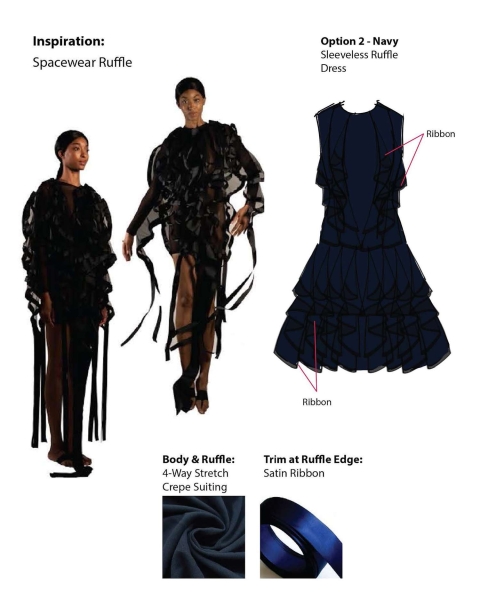
InStyle: Who is your biggest inspiration or muse?
DW: The woman of the future is my biggest inspiration. I like to imagine how the world will change over time, and I make concept-driven clothes that fit that world. It often includes some element of sensory experience and has a soft, feminine aesthetic. I am currently making fashion for novel conditions, such as zero gravity in space and underwater play.
InStyle: Which star has the best red carpet style?
DW: The partnership between Zendaya and Law Roach is very exciting, especially for the Dune [Part II] red carpets, because what is being presented are designers who have a unique view on futurism.
InStyle: What's one thing you would change about the fashion industry?
DW: Much like the food industry, garment making has become outsourced for cheaper and more convenient options. But looking back in history, there was a boon in fashion expression when people made clothes at home. In addition, your average shopper could see the value of designer goods because they knew from experience what it took to make a quality garment. I'd like to see a change back in the direction of home sewing and autonomy from the fashion monopoly system.
Anthony Oyer
Anthony Oyer's design sensibilities may have something to do with the fact that he grew up "surrounded by cornfields" in Ohio. While he loves conceptual fashion — which he discovered on trips to visit Chicago with his family — and currently designs for a major brand outside of his own eponymous label, he's considerate of the fact that his wearer might not always look for that. "I create pretty intricate evening wear, but it's always paired back slightly. It's kind of that Midwestern simplicity at the end of it," Oyer says. "It might be a beautiful ball gown, but it's all one color. I just think there's something about growing up in a very small town… There were a lot of farmers. It's a very cut-and-dry circle. I always pull back a little bit at the end, which I think is a nice touch."
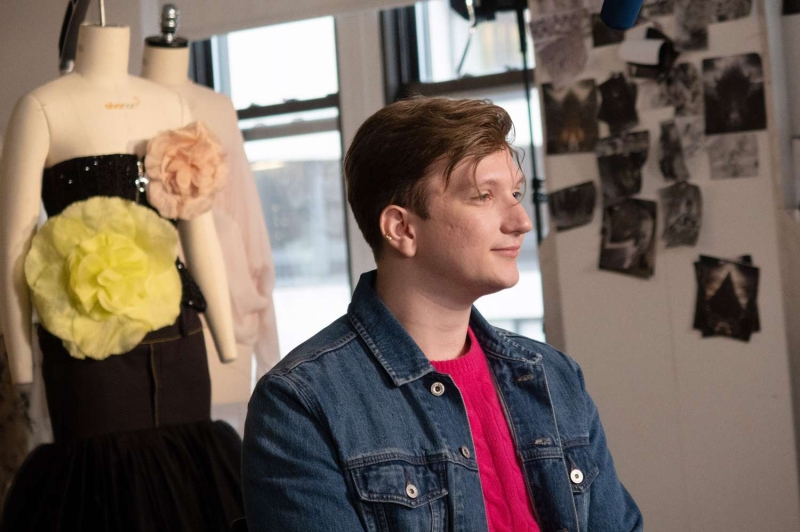
Kotb and Bush Hager thought that the pieces he made for them struck that balance perfectly. Both said they would never think of wearing a corset, but the ones he created for them turned out to be some of the most exciting looks. "To know that we would look good in a corset and with all of the details?" Kotb says. "Every single thing, like the ribbons he used, the zipper detail he used — he is a huge talent."
InStyle: If you could pick a song to go along with your design aesthetic, what would it be and why?
AO: The song that best encompasses my work would be “American Teenager” by Ethel Cain. Not only am I obsessed with the world-building and style of Ethel, but also the construction of the song. On the surface, it sounds like any uplifting pop song about growing up in America. But after listening to the lyrics, you can hear that it's not uplifting at all. I want my work to be visually appealing to everyone, but it still needs to stand for what I believe in and have a voice of its own.
InStyle: How do you consider sustainability when you are designing?
AO: Sustainability has to be at the forefront of everything we all do. It's a big undertaking, and getting it perfect at such a small level is impossible. But some things I do in my work to stay as sustainable as possible are using real fabrics. By that, I mean I do not use anything with polyester. My garments are constructed of silk, leather, cotton, wool, and cashmere — never any plastic or polyester. I also produce my garments locally in [New York City’s] garment district. Having samples made overseas is cheaper, but the impact of the transportation of the garments, be it airplane or ship, is harmful to the environment.
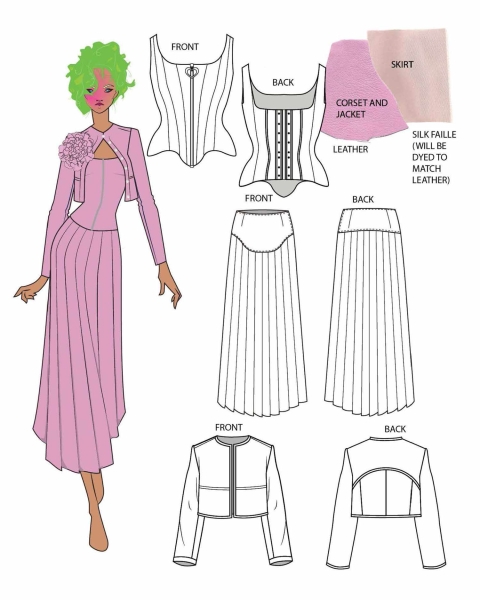
InStyle: Which famous person would you most want to wear your designs?
AO: Helena Bonham Carter. She has such a unique style that's curated to just her. She's able to mix and match decades, designers, and styles and create a look that is cohesive and completely original.
InStyle: Are there any fashion designers whose careers you'd want to emulate?
AO: I try not to compare myself to others, but there are so many designers who have been able to create whole new worlds and fantasies with their designs. Yves Saint Laurent would be the most aspirational for me. He was able to take what he learned under Christian Dior and reinterpret it into his own wildly successful company. He was always able to float above the trends and still be relevant, and he also consistently had the best quality garments. Quality is more important than anything. It's much more special for the wearer if the inside of the garment is even more beautiful than the outside.
Margarita and Cristina Ng Ng
Starting a family business is one thing, but moving to a new city, attending every class together, and designing a fashion line with your twin takes it to another level. For Margarita and Cristina Ng Ng, doing so was a no-brainer. "We know each other so well. We actually have the same taste, same style," Margarita says. "But there are times that we have fights. We disagree on some things, but we do work it out."
In fact, the Chinese-Dominican siblings were so determined to do this together that when Margarita didn't initially get into fashion school, Cristina waited so they could go together. "We were like, We need to ensure we attend the same classes because I can't do it without my sister,” says Margarita. “Sometimes, when I don't understand [something], maybe my sister knows." That detail moved Bush Hager because, as a twin herself, she knows the bond. "We understood them completely, totally like soul to soul," Bush Hager says of working with the sisters.
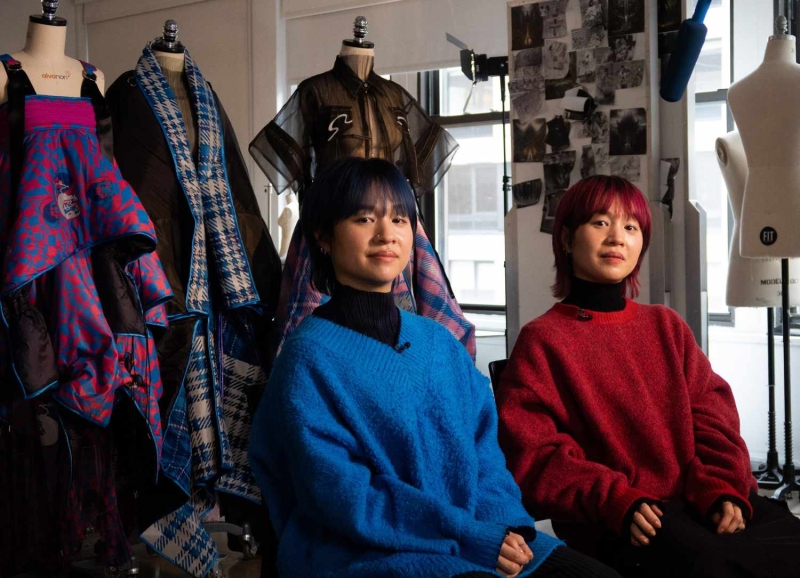
As for their style, it is self-described as "avante garde" and "conversational." More so, it's art. With exaggerated silhouettes and exciting mixes of textiles, the pair have created work that speaks to the expressive side of fashion that can often be forgotten by an industry caught up in trends. Kotb says that helped her step out of her comfort zone, "I would never ever have worn what they made until I put it on and it looked amazing."
InStyle: As a young designer, what is the one thing you wish people understood about starting out?
Cristina Ng: Cultivating patience and resilience is essential in staying steadfast on the path to realizing your dream as a fashion designer. By cultivating these virtues, you not only withstand the inevitable setbacks, but also transform them into stepping stones toward your ultimate vision.
InStyle: Who is your biggest inspiration or muse?
CN: Our biggest source of inspiration is undoubtedly our parents. They are true examples of hardworking individuals. Our father left his homeland alongside his older brother in pursuit of a more promising life. After a few years of saving money, he was able to purchase flight tickets to bring our mom and older brother to the Dominican Republic. Life was not easy for them. They had to adapt to a different culture and learn a new language. Our mom had to take care of three kids and help with a business with dad.
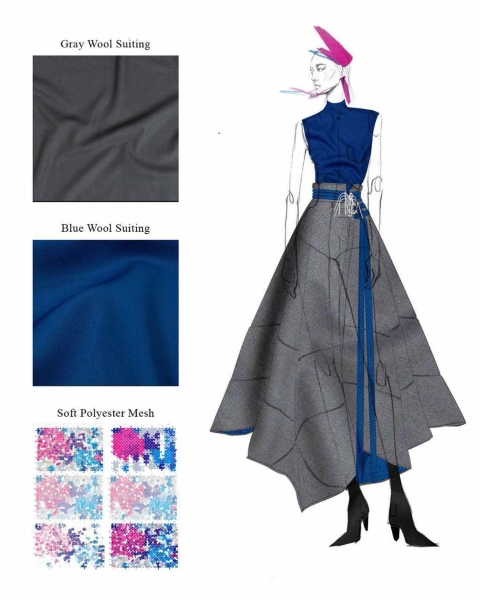
InStyle: Which famous person would you most want to wear your designs?
CN: We find ourselves captivated by Zendaya's unparalleled sense of style. Dreaming of the day when our designs could grace Zendaya's radiant presence!
InStyle: What's one thing you would change about the fashion industry?
CN: To foster a more sustainable ethos across all aspects of the supply chain. This entails ensuring fair labor practices throughout production processes; prioritizing sustainability in materials sourcing, manufacturing techniques, and consumption patterns is imperative for mitigating the environmental impact of the industry. By championing sustainability, we can pave the way for a fashion landscape that respects human rights and preserves our planet for generations to come.

